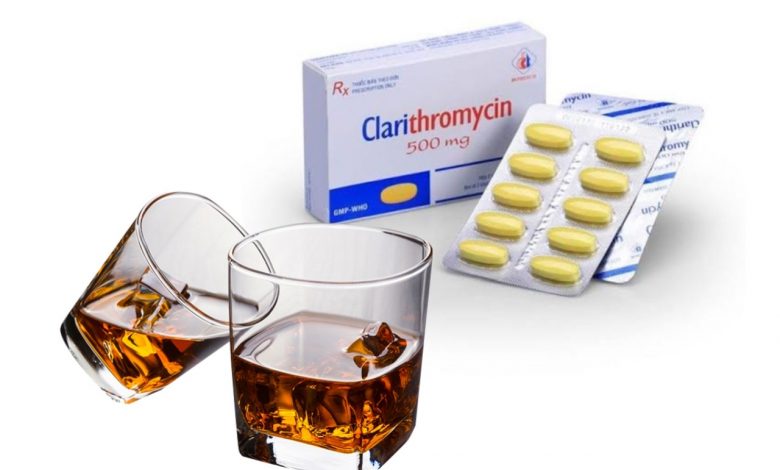Can I Take Clarithromycin 500 mg and Alcohol?

Throughout the 10,000 or so years that humans have been drinking fermented beverages, they’ve also been arguing about their merits and demerits. The debate still simmers today, with a lively back-and-forth over whether alcohol is good for you or bad for you.
It’s safe to say that alcohol is both a tonic and a poison. The difference lies mostly in the dose. Moderate drinking seems to be good for the heart and circulatory system and probably protects against type 2 diabetes and gallstones. Heavy drinking is a major cause of preventable death in most countries. In the U.S., alcohol is implicated in about half of fatal traffic accidents. Heavy drinking can damage the liver and heart, harm an unborn child, increase the chances of developing breast and some other cancers, contribute to depression and violence, and interfere with relationships.
Because alcohol can adversely interact with hundreds of commonly used medications, it’s important to observe warning labels and ask your doctor or pharmacist if it’s safe to use alcohol with any medications and herbal remedies that you take.
What is clarithromycin?
Clarithromycin oral tablet is a prescription drug that’s available as the brand-name drug Biaxin. It’s also available as a generic drug. Generic drugs usually cost less. In some cases, they may not be available in every strength or form as the brand-name version.
Clarithromycin oral tablet comes in an immediate-release release form and an extended-release form. Clarithromycin also comes as an oral suspension. Clarithromycin is used to prevent and treat certain infections caused by bacteria.
Clarithromycin may be used with other drugs (ethambutol, rifampin, amoxicillin, lansoprazole, omeprazole, or bismuth) to treat stomach ulcers or mycobacterial infections.
How it works
Clarithromycin belongs to a class of drugs called antibiotics (macrolides). A class of drugs is a group of medications that work in a similar way. These drugs are often used to treat similar conditions.
Clarithromycin works by stopping the bacteria that are causing an infection from multiplying. This drug should only be used to treat or prevent bacterial infections. It shouldn’t be used to treat viruses such as the common cold.
How should I take Clarithromycin?
Clarithromycin comes as a tablet, an extended-release (long-acting) tablet, and a suspension (liquid) to take by mouth. The regular tablet and liquid are usually taken with or without food every 8 (three times a day) to 12 hours (twice a day) for 7 to 14 days. The extended-release tablet is usually taken with food every 24 hours (once a day) for 7 to 14 days. Your doctor may tell you to take clarithromycin for a longer time depending on your condition. Take clarithromycin at around the same time(s) every day. Follow the directions on your prescription label carefully, and ask your doctor or pharmacist to explain any part you do not understand. Take clarithromycin exactly as directed. Do not take more or less of it or take it more often than prescribed by your doctor.
Shake the suspension well before each use to mix the medication evenly.
Swallow the long-acting tablets whole; do not split, chew, or crush them.
You should begin to feel better during the first few days of treatment with clarithromycin. If your symptoms do not improve or get worse, call your doctor.
Take clarithromycin until you finish the prescription, even if you feel better. If you stop taking clarithromycin too soon, or skip doses, your infection may not be completely treated and the bacteria may become resistant to antibiotics.
Can I Take clarithromycin And Alcohol Together?
No, drinking moderate amounts of alcohol while taking clarithromycin will not usually lower the medications effectiveness, but it may cause side effects and hinder your body’s natural ability to heal itself.
Drinking alcohol while you’re fighting an infection can lead to dehydration, upset stomach, interrupt normal sleep, and lower your immune response. Some antibiotics and can also be dangerous for your liver, so it’s important to check with your doctor or pharmacist before you mix alcohol with clarithromycin.
If your doctor tells you that you shouldn’t drink alcohol, ask how long you should wait before drinking again. You may need to wait at least 72 hours after finishing your course of clarithromycin before having any alcohol.
Listening to your doctor or pharmacist’s advice can help you avoid the effects of an alcohol-drug interaction.
Clarithromycin Side Effect
Common Side effects of Clarithromycin include:
• gastrointestinal (GI) effects, general
• abnormal taste
• diarrhea
• nausea
• vomiting
• elevated blood urea nitrogen (BUN)
• abdominal pain
• rash
• indigestion
• heartburn
• headache
• longer time for blood to clot
• severe allergic reaction (anaphylaxis)
• loss of appetite
• anxiety
• Clostridium difficile colitis (fever, diarrhea, abdominal cramps)
• dizziness
• difficulty breathing
• elevated liver function tests
• swelling of the tongue
• hallucinations
• liver dysfunction
• inflammation of the liver (hepatitis)
• low blood sugar (hypoglycemia)
• increased alkaline phosphatase (ALP) levels in the blood
• increased aspartate aminotransferase (AST) levels in the blood
• increased bilirubin levels in the blood
• increased serum creatinine levels in the blood
• yellowing of skin and eyes (jaundice)
• decreased amount of white cells in the blood (leukopenia)
• manic behavior
• neuromuscular blockage
• decreased white blood cells to fight infection (neutropenia)
• pancreatitis
• psychosis
• heart rhythm disorder (QT prolongation)
• seizures
• Stevens-Johnson syndrome (flu-like symptoms, followed by a blistering rash)
• low levels of platelets (thrombocytopenia)
• gas (flatulence)
Postmarketing side effects of Clarithromycin reported include:
• blood and lymphatic system disorders: low levels of platelets (thrombocytopenia), decreased white blood cells to fight infection (agranulocytosis)
• cardiac disorders: rapid and irregular heartbeat (torsades de pointes), fast heart rhythm (ventricular tachycardia), abnormal rapid heart rhythms (ventricular arrhythmia)
• ear and labyrinth disorders: spinning sensation (vertigo), ringing in the ears (tinnitus), deafness was reported chiefly in elderly women and was usually reversible
• gastrointestinal disorders: pancreatitis acute, tongue discoloration, tooth discoloration, burping
• hepatobiliary disorders: severe allergic reaction (anaphylactic reaction)
• immune system disorders: severe allergic reaction, rapid swelling (angioedema)
• infections and infestations: colitis due to recent use of antibiotics (pseudomembranous colitis), bacterial infection of the skin (cellulitis), infection, vaginal infection
• investigations: slow blood clotting time (prothrombin time prolonged), white blood cell count decreased, international normalized ratio increased; abnormal urine color has been reported, associated with liver (hepatic) failure
• metabolism and nutrition disorders: low blood sugar has been reported in patients taking oral hypoglycemic agents or insulin
• musculoskeletal and connective tissue disorders: disease of muscle tissue (myopathy), destruction of muscle tissue (rhabdomyolysis) was reported and in some of the reports, clarithromycin was administrated concomitantly with statins, fibrates, colchicine or allopurinol, muscle spasm, impaired neck flexion (nuchal rigidity)
• nervous system disorders: convulsions, inability to taste (ageusia), abnormal sense of smell (parosmia), loss of sense of smell (anosmia), numbness and tingling, tremors, sleepiness, loss of consciousness, involuntary movement (dyskinesia)
• psychotic disorders: psychotic disorder, confusional state, depersonalization, depression, disorientation, manic behavior, hallucination, abnormal behavior, abnormal dreams
• renal and urinary disorders: inflammation in the kidney (nephritis interstitial), kidney (renal) failure
• skin and subcutaneous tissue disorders: Steven-Johnson syndrome (flu-like symptoms, followed by a blistering rash), dermatologic disorder (toxic epidermal necrolysis or TEN), drug rash with eosinophilia and systemic symptoms (DRESS), Henoch-Schonlein purpura (inflammation of small blood vessels), acne, blistering eruptions (dermatitis bullous), excessive sweating, flat, red area with small bumps (maculo-papular rash)
• vascular disorders: bleeding (hemorrhage)
• other: reports of colchicine toxicity, some resulting in death, with concomitant use of clarithromycin and colchicine, especially in the elderly, some of which occurred in patients with kidney (renal) insufficiency, asthma, nose bleed, blood clot in the lung (pulmonary embolism)
This document does not contain all possible side effects and others may occur. Check with your physician for additional information about side effects.





